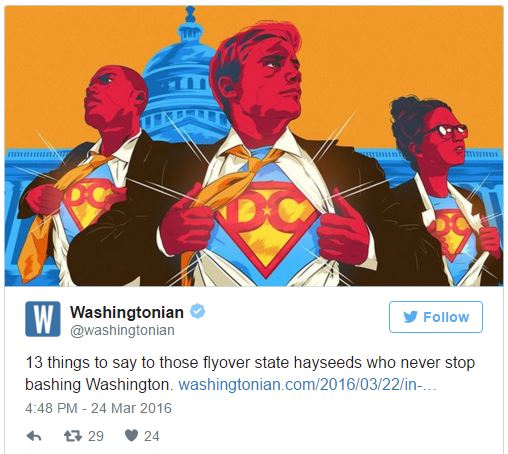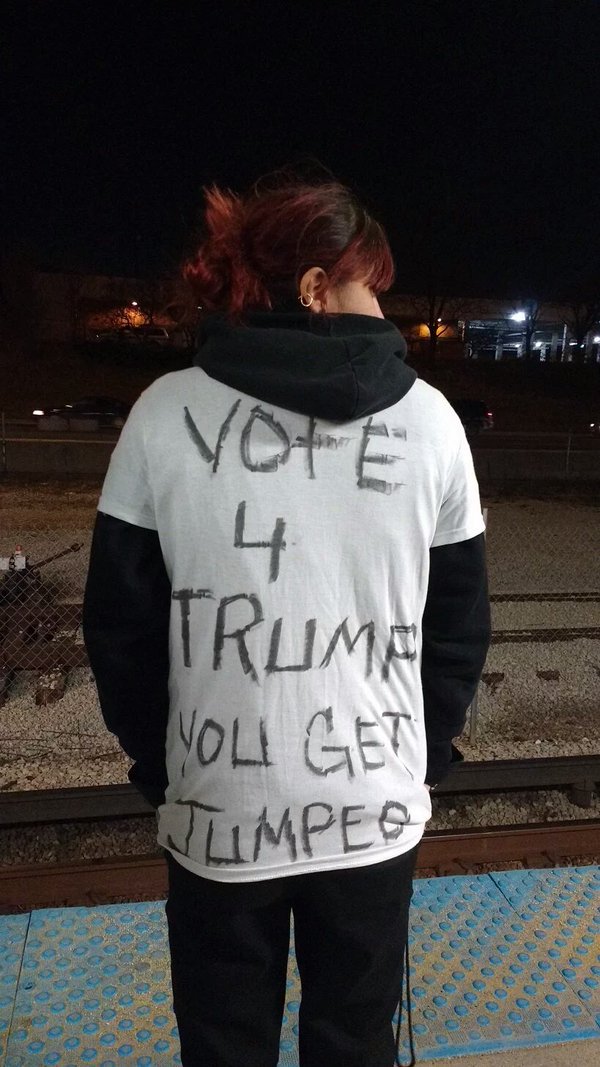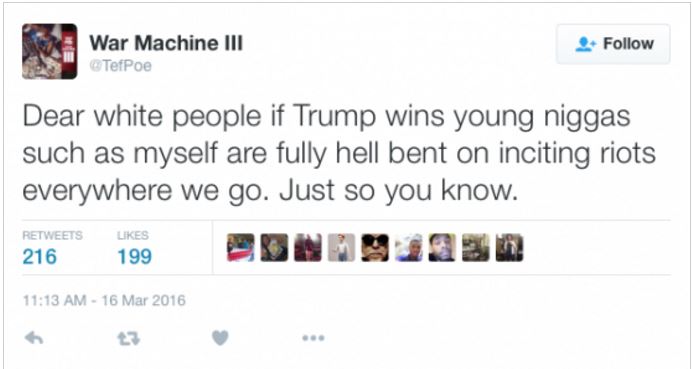A little insight
The Washingtonian magazine published a piece defending the culture and lifestyle of Washington DC. They announced their article with this lovely tweet.
Being an ignorant hayseed who has the misfortune to have lived in both Flyover Country and the Deep South, I though I should read this article so that I could understand my intellectual betters, better.
Note to the people in DC: Yes, I can read. My favorite book is about a character who attempts inveigle the book’s anonymous protagonist into consuming verdant breakfast foods. It’s quite the nail biter.
First of all, the article was a compilation. Each of the 13 reasons listed was a separate article written by a different author.
–
Some were pointless:
I make no bones about how I feel about most of what is called art these days. If Washington DC is not littered with bohemian, hipster, artists who work in poop-smears, that is actually a plus for your city.
–
One missed the point all together:
OK. The author found six federal employees in DC that actually do some good. Four of them are scientists or engineers, not typical bureaucrats. The federal workforce in DC measures at about 47,000 people. Congrats on finding the 0.013% of federal employees who are worth a damn. That leaves about 46,994 federal employees in DC who range from worthless to completely-obstructionist-to-normal-life (and yes, I am including POTUS and Congress in that assessment).
–
But two of them really showed some deep and terrible insight into the culture of DC that is the worst combination of elitist and power hungry:
I think the great Milton Friedman said it best when he said “is it really true that political self-interest is nobler somehow than economic self-interest?”
My answer, of course is “no.” Political self-interest is less noble than economic self-interest. Why? Because when I try to make it rich in business, I do so in a free market system in which trade is voluntary. As a business man, I can’t oppress anybody. I can’t force or coerce people. I have to make a product or provide a service that people want, and want to pay me for. I have to bring value. I have to create and innovate.
As politician, to make myself successful, I have to broker power. To enrich my coffers, I would have to use the power of my office to hinder some at the request of others through regulation. I create nothing, I only take from some and redistribute to those who support me. I deal in favors. My wealth comes from getting to chose who I step on and who I give handouts to.
Obsession with power is worse than obsession with money. Obsession with power is obsession with control. It’s the desire to rule over the lives of people. To bend others to your will with force. The obsession with money is the love of opulence. I fear the man who wants to manage the lives of people far more than some mogul on a super yacht spraying his girlfriends with a champagne gun.
Ah yes, paternalism. Nothing makes me feel more sympathy for my fellow man than my fellow man telling me that he’s smarter than me and that I should be forced to do what he says because he knows what better for me than me.
Don’t take my word for it, take thiers:
“Yes, [DC Bureaucrats] stock-in-trade is abstractions: statistics, seminars, social science. But those abstractions—that out-of-touchness, if you will—are the very things that help our technocrats rise above parochialism. They don’t worry about the effects of policies on their neighbor or on the business around the corner. Sure, our wonks have a point of view, an ideology even. But they cast their arguments in terms of the national interest, and they mean it. If Washington were allowed to make policy—without the heartland and its parochialism getting in the way—we might actually fix this place”
I am a big believer in the value of expertise. Expertise in a subject is obtained through the combination of education and experience. Call me cynical, but I had a hard time believing that a bureaucrat in a non-profit, ideological, special interest, think tank; has expertise in whatever field they are trying to regulate. This is how you get leading presidential candidates pledging to do things that are scientifically impossible.
These people are not experts, they are erudite elitists. If they really were experts, they’d of been able to predict how changing lending and banking regulations would have resulted in a financial bubble and bust that took out one-third of the money in the economy…and… it’s gone.
The think tank experts told us that we need to stimulate the economy to save jobs. Turns out the think tank experts were wrong. The more the plans fail, the more the planners plan.
Sure, the track record of these people is atrocious. Sure, as soon as you give them the ability to regulate your business (for your own good), they are going to go after your big gulps and texting habits too. Because they know better.
–
You know what, if the best defense that DC can muster against DC haters is “were power mad, elitists, who want to micromanage your lives, because we’ve gone to a handful of expensive colleges that have told us we’re smarter than everybody else.” I’m pretty sure that justifies all the hatred DC gets… and more.









